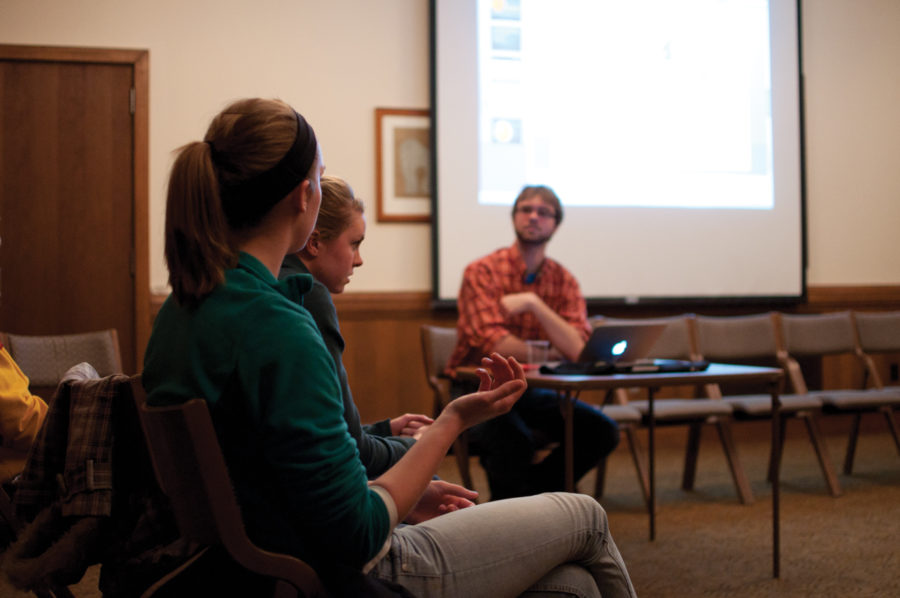Students speak out about US oil dependency at open forum
Photo: Karuna Ang/Iowa State Daily
(Left) Hannah Dankbar, sophomore in political science, expresses her opinion about China’s position in the energy industry while Christopher Schubert, senior in political science, who is also the moderator of the open forum, listens to her, Tuesday, Feb. 15, at the Gold Room of Memorial Union.
February 15, 2011
Students had the opportunity to speak about the U.S. oil dependency Tuesday.
Chris Schubert, senior in political science and Student Union Board awareness director, decided to initiate the open forum.
“I really wanted to provide a space for students to interact with students,” Schubert said.
“One to one, without the filter of a lecture coming in from outside the community or professor or panel like other events, seminar, or anything like that. I wanted it to be students talking with students, student-driven and really get the young people talking to each other about some of the issues that we’re facing.”
Students were engaged in a variety of topics regarding U.S. oil dependency, varying from the importance of petroleum to the possibilities of weaning off of oil.
“I think it’s going to take a lot more than what people initially see to wean ourselves, quote-un-quote, off of oil,” said Dalton Lee, junior in political science and environmental studies. “We’re going to have to implement a lot of sustainable initiatives while we’re still stopping oil. We can’t just cut it because it’s an addiction, there would be so much economic withdrawal, so many things like that that it would be devastating.”
Pantelis Korovilas, senior in liberal studies, expressed a great deal of interest in rethinking economic models, including the use of oil.
“By rethinking our economic models, that’s going to cause us to rethink our political policy,” Korovilas said. “Economics is so intimate in our political and social life, so changing the way we think about economics intellectually will change the way we act in an economic sense.”
With this immense struggle to reduce petroleum use, Lee said removing oil dependency will be timely.
“I feel like oil at this point is inevitable, we’re going to have to use it for at least another decade because everything that we’ve made, all our machines, everything is based on oil. Basically we need to have another economic revolution,” Lee said.
Consumers can make choices but consumers are also limited in their choices and they face personal economic decisions, Korovilas said.
“The best choice for consumers isn’t always an environmentally friendly one because they have to feed their kid at the end of the evening, which means they have to think in purely monetary terms,” Korovilas said.
A significant change in consumption, Korovilas said, would only solve 30 percent of the problem.
“Right now there’s more diffusion of responsibility than there’s ever been and although people are becoming more aware of the situation, they also diffuse that responsibility because there’s so many other people doing it,” Lee said.
Schubert said for change to happen, people need to be empowered, something he said people seem to lack.
“We sell everybody too short if we for a minute think that the American public can’t wake up or the American public is not capable of change,” Schubert said.
“Once you start doing anything, then you’ve created this tremendous impact because you’ve done something that changed the course of history. This event, for example, everyone who was here changed each other’s history, we’ve changed each other.”
Wherever the United States is five years from now, change, students said, is a necessity.
“The American people, whether they’ll like it or not, are eventually going to have to downsize assets. Just because we’re not going to have enough parking lots, we can’t use farms, there’s priorities,” Lee said.
“Once comforts get in the way of a necessity, like with oil, then it really makes for disastrous outcomes.”







